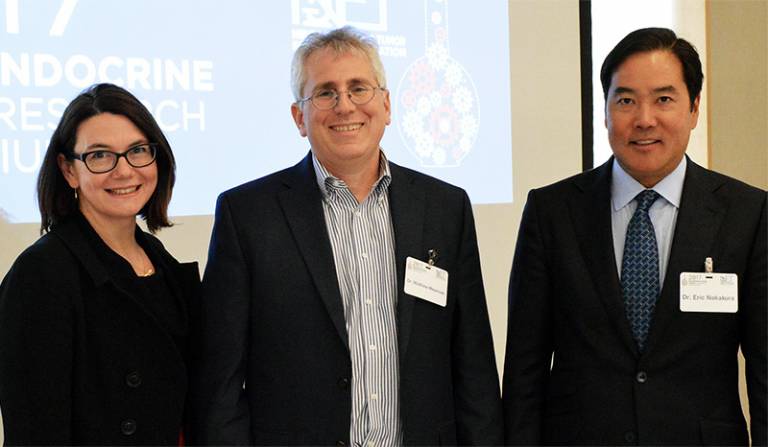International team receive $1.2 million boost for neuroendocrine cancer research
27 April 2017
A scientific collaboration between UCL, Dana-Farber Cancer Institute, UCSF Medical Centre and the UCL Cancer Institute / Royal Free Hospital London has been awarded a $1.2m accelerator grant from the Neuroendocrine Tumor Research Foundation (NETRF) to help advance research into small intestine neuroendocrine tumours (SI-NETs).

Principal Investigators, Dr Matthew Meyerson (Dana-Farber), Dr Eric Nakakura (UCSF) and Dr Chrissie Thirlwell (UCL), are using the funding to support a research programme that aims to find the cause or causes of SI-NETs. The team’s approach has the potential to identify inherited, somatic (non-inherited) genetic, epigenetic and infectious causes of SI-NETs.
Almost all cancers are known to be caused by harmful changes in the DNA of cells. The specific changes in DNA that convert normal cells of the small intestine into neuroendocrine tumour cells are not yet understood. However, this could be set to change as rapid advances in DNA sequencing technology now provides a tremendous opportunity to study SI-NET DNA in more detail - something that the research team hope to exploit to its full potential.
“We are investigating all credible possibilities.” says Dr Chrissie Thirlwell, Senior Lecturer and Consultant Medical Oncologist at UCL Cancer Institute and the Royal Free Hospital, “We are questioning whether SI-NETs are caused by DNA changes in later life or by aberrant genes inherited at birth; environmental influences or infectious agents - or is it a combination of all these factors? In addition, we’ll be investigating the cell of origin for these tumours - a really exciting part of the project. By utilising single cell sequencing approaches, we can try and uncover which cells initiate SI-NET tumour formation. This information can then be used to develop cellular or animal models for use in further research.”
New insights into the molecular mechanisms that define SI-NETS are urgently needed to help advance the therapeutic options open to cancer patients:
“SI-NETs are the major cancer subtype of the small intestine. Most SI-NET patients cannot undergo surgery because by the time the disease is detected, it’s usually advanced or spread to other organs. Currently, SI-NET patients don’t benefit from molecularly targeted therapies - we hope our research will help change this” says Dr Thirlwell.
Director of Research at NETRF, Dr Effie Tzameli says, “We are excited to fund powerhouse proposals that marry ground-breaking ideas with state-of-the-art technologies,”. “These projects bring together some of the brightest minds in the field, to work together and help transform the landscape of NET research.”
NETRF funds research to discover cures and more effective treatments for carcinoid, pancreatic, and related neuroendocrine cancers. The SI-NETs project is one of three collaborative projects to receive an NETFR accelerator grant.
Further information
- NETRF press release 'NETRF makes $4 million in grants to advance research of a poorly understood cancer.'
- Main image: Drs. Thirlwell, Meyerson and Nakakura courtesy of NETRF
- Research paper: 'Prognostic Impact of Novel Molecular Subtypes of Small Intestinal Neuroendocrine Tumor.' Clinical Cancer Research
Principal Investigators SI-NET project:
- Dr Chrissie Thirlwell, UCL/Royal Free Hospital
- Dr Matthew Meyerson, Dana-Farber
- Dr Eric Nakakura, UCSF
Key Collaborators SI-NET project:
- Dr Javier Herrero, Bill Lyons Informatics Centre, UCL
- Dr Grace E. Kim, UCSF
 Close
Close

